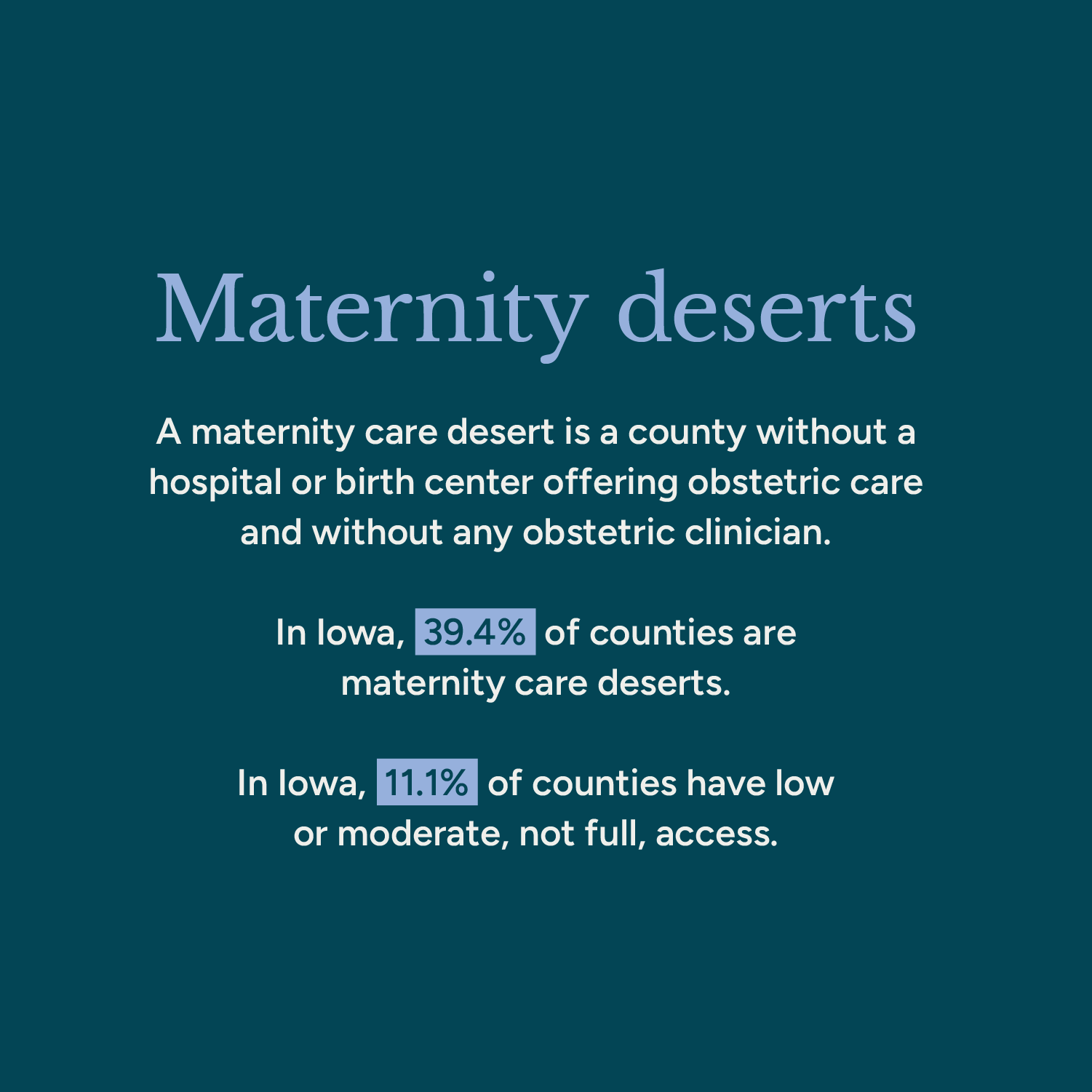
Across Iowa, expectant mothers are traveling farther, facing longer wait times, or going without care altogether. Why? Because access to reproductive healthcare—especially maternity care—is vanishing. Hospitals are closing. Clinics are shutting down. And it’s rural Iowans who are paying the price.
Maternity care deserts are growing in Iowa, raising challenges for Iowa healthcare access and highlighting gaps in women’s healthcare rights.
A maternity care desert is a county without a hospital or birth center offering obstetric care, and without any OB/GYNs or certified nurse midwives. In Iowa, these deserts are spreading rapidly.
- As of 2024, 57% of Iowa counties have no hospital offering obstetric services
- One-third of Iowa’s 99 counties are now considered maternity care deserts
- 68,815 women of reproductive age in Iowa live in a county with zero OB/GYN access

Since 2019, more than a dozen Iowa hospitals have shut down or stopped delivering babies. As a result, healthcare deserts have formed across the state, leaving thousands without safe, timely, local care.


Restrictions are driving doctors away
Iowa’s increasingly strict abortion laws are doing more than limiting patient care, they’re driving healthcare professionals out of the state.
In a powerful Des Moines Register op-ed from June 2025, a newly licensed physician shared her decision to leave Iowa, citing the state’s dangerous legal landscape for doctors:
“I will not work in a state where I could be jailed for saving a patient’s life.”
This doctor’s story isn’t unique. OB/GYNs across Iowa are choosing to:
- Leave the state for safer and more supportive environments
- Avoid practicing obstetrics altogether, fearing legal retaliation
- Turn down jobs in Iowa, leaving critical positions unfilled
According to the National Partnership report, legal restrictions on reproductive care are a leading reason OB/GYNs are avoiding rural practice. When laws put doctors at legal risk for providing standard care, including lifesaving abortion procedures. It’s no surprise they choose to work elsewhere.
This chilling effect is contributing directly to Iowa’s maternity care desert crisis. When we restrict care, we also restrict the workforce.
Rural families are facing impossible choices
Fewer OBs means more travel time. In some parts of the state, patients now drive over 90 minutes for a prenatal appointment or to deliver their baby. That delay can turn routine health needs into life-threatening emergencies.
In a state where:
- 14% of pregnant individuals don’t have a birthing hospital within 30 minutes
- And over 40 counties have no OB/GYN access at all
- The loss of care isn’t an inconvenience, it’s a crisis.

Reproductive healthcare is more than pregnancy
Restricting reproductive care doesn’t just impact people planning to give birth. Reproductive healthcare includes:
- Cervical and breast cancer screenings
- STI prevention and treatment
- Menstrual disorders
- Fertility counseling and menopause support
- Access to contraception and preventive screenings
- Surgical procedures like hysterectomies and fibroid removal
- Gender-affirming care
- Diagnosis and treatment of chronic conditions like endometriosis and PCOS
Without OB/GYNs and reproductive health providers, Iowans of all ages are losing access to essential, often life-saving care.

Reproductive healthcare is more than pregnancy or abortion
What’s at stake
This is about more than politics. This is about whether Iowa families can get to a doctor in time. Whether a baby is born in a hospital or in the back of a car. Whether cancer is caught early or too late.
When reproductive healthcare access is restricted, the entire system suffers. Providers leave. Clinics close. Patients go without care. And communities, especially rural ones, are left behind.
The bottom line
- Iowa ranks last in OB/GYNs per capita
- 57% of counties lack hospital obstetric services
- Over 68,000 women live in counties with no OB/GYN at all
- The number of maternity care deserts is growing, especially in rural areas
- Reproductive care includes essential services for all ages not just pregnancy
- And Iowa’s own doctors are now leaving because of dangerous laws
We cannot talk about healthcare access without addressing reproductive rights. It’s time to look past the headlines and recognize the economic and human cost of these policies.
Learn more
📚 OBGYN Power – Loss of Access in Iowa
🗞️ Des Moines Register: New Doctor Leaving Iowa (2025)
📊 GAO Report on Abortion Access & Economic Impact
For more reproductive rights information and updates on Iowa healthcare access, visit our resources page or sign up for our newsletter.
Empower change.
Sign up for our newsletter and stay informed on reproductive healthcare issues in Iowa.



